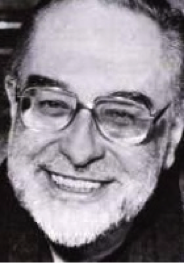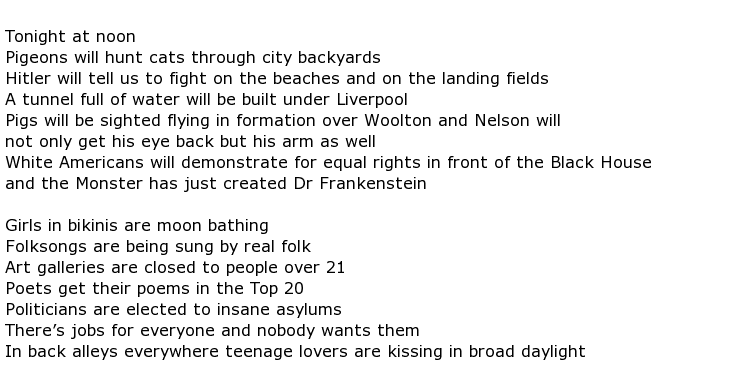 Although well known as an English poet, who burst onto the popular scene around the 1960s and 1970s, Adrian Henri was also an artist whose work was exhibited at galleries both during his lifetime and after his death. He was fortunate to study art at Kings College, Newcastle under such noted tutors as Lawrence Gowring, Roger de Gray and Richard Hamilton. It was the mid 1950s and a new generation of “pop painters” was emerging and Adrian joined them enthusiastically, producing work that sometimes had a darkly surrealistic tone, while other pieces were of the amusing variety. As a self-confessed atheist living in a staunchly Catholic area of Liverpool he produced paintings that were designed to deliberately shock people.
Although well known as an English poet, who burst onto the popular scene around the 1960s and 1970s, Adrian Henri was also an artist whose work was exhibited at galleries both during his lifetime and after his death. He was fortunate to study art at Kings College, Newcastle under such noted tutors as Lawrence Gowring, Roger de Gray and Richard Hamilton. It was the mid 1950s and a new generation of “pop painters” was emerging and Adrian joined them enthusiastically, producing work that sometimes had a darkly surrealistic tone, while other pieces were of the amusing variety. As a self-confessed atheist living in a staunchly Catholic area of Liverpool he produced paintings that were designed to deliberately shock people.
Adrian’s roots could be traced back to Mauritius – his grandfather was from there. He was born in 1932, in Birkenhead, but the family moved when he was only 6 to Rhyl in North Wales. He enjoyed a grammar school education before going to Art College in the north east. He chose to return to the Liverpool area after that though as it was the only place he really wanted to be. He had spells teaching art in both Liverpool and Manchester Colleges of Art while his paintings continued to receive appreciation in all quarters, sometimes winning him awards. Later on when his friends and contemporaries migrated south, seeking the bright lights of 1960s “Swinging London”, Adrian remained in Liverpool. He found time to be married twice but neither marriage bore him any children
As well as being a talented artist he founded a poetry-rock group called The Liverpool Scene with friends Brian Patten and Roger McGough. All three quickly rose to prominence under the banner of the “Merseybeat Zeitgeist”. All three of them contributed to the movement that made poetry attractive to young people all over Britain. You could say that they were the equivalent of modern day “rap” artists, characterising the new popular culture of the 1960s in verse.
His Liverpool lifestyle, which included writing poetry, plays and music, as well as performing rock and roll, brought him into contact with famous contemporaries such as the playwright Willy Russell and musicians George Melly, Paul McCartney and John Lennon. Patten, McGough and Henri published a best selling anthology of poetry called The Mersey Sound in 1967which included over a hundred of Adrian’s poems. One of them, Tonight At Noon, leans very much towards the nonsense style of poetry where everything seems to be the wrong way round (or maybe it makes perfect sense!). Here are two verses from it:

He was generally seen as the leader of the poetry-rock group The Liverpool Scene and they achieved a fair amount of success, releasing four LP records of poetry and music. While enjoying his artistic and musical life his first love though was always poetry and he gave many live readings in small venues, schools and colleges.
Adrian suffered a stroke in 1998 and he never really recovered from it. He was unable to walk and talk properly again, although he was determined to beat it. He started drawing again but his health was fading fast.
In 2000, at the age of 68, Adrian Henri died in Liverpool, just 24 hours after being granted the Freedom of the City for his services to art and culture. He left behind a legacy of poetry, art and music and this optimistic philosophy –


